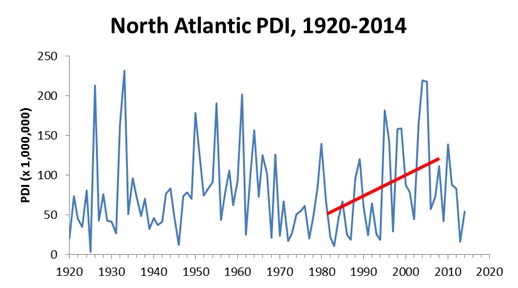Climate change 3: The grand narrative availability cascade is making us stupid
In 2007 Professors Timur Kuran and Cass Sunstein defined the concept of an “availability cascade,” which is a self-reinforcing process of collective belief formation by which an expressed perception triggers a chain reaction that gives the perception of increasing plausibility through its rising availability in public discourse.” Prof. Judith Curry, a climate scientist at the Georgia Institute of Technology, shows us how that is exactly what has taken over the climate change debate:
Climate change has become a grand narrative in which human-caused climate change has become a dominant cause of societal problems. Everything that goes wrong then reinforces the conviction that that there is only one thing we can do prevent societal problems – stop burning fossil fuels. This grand narrative misleads us to think that if we solve the problem of climate change, then these other problems would also be solved.
Politicians, activists and journalists have stimulated an “availability cascade” to support alarm about human-caused climate change. … [T]he more attention a danger gets, the more worried people become, leading to more news coverage and greater alarm. Because slowly increasing temperatures don’t seem alarming, the “availability entrepreneurs” push extreme weather events and public health impacts as being caused by human-caused climate change, more of which is in store if we don’t quickly act to cool the planet by reducing fossil fuel emissions.

What does the IPCC say about human-caused climate change and extreme weather? Curry explains that, our perception, and the damage statistics?
In 2012, the IPCC published a Special Report on Managing the Risks of Extreme Events and Disasters to Advance Climate Change Adaptation (SREX). The Report found low to medium confidence of a trend in droughts in some regions and the frequency of heavy rains in some regions, and high confidence of a trend in heat waves in Australia. There is no trend in hurricanes or wild fires. Attribution of any trend in extreme weather events to human caused climate change cannot be done with any confidence. With regards to the perception (and damage statistics) that severe weather events seem more frequent and more severe over the past decade, there are several factors in play. The first is the increasing vulnerability and exposure associated with increasing concentration of wealth in coastal and other disaster-prone regions. The second factor is natural climate variability. Many extreme weather events have documented relationships with natural climate variability; in the U.S., extreme weather events (e.g. droughts, heat waves and hurricanes) were significantly worse in the 1930’s and 1950’s.
Curry thinks climate change is making us stupid:
Is climate change making us stupid? I fear that the answer is “yes.” This problem is exacerbated by politically correct climate change orthodoxy, enforced by politicians, advocates and the media in an availability cascade, which is destroying our ability to think rationally about how we should respond to climate change. As a result, we have created a political log-jam over this issue, with scientists caught in the cross-fire.
Peter Zeller is Director of Operations at Center of the American Experiment.